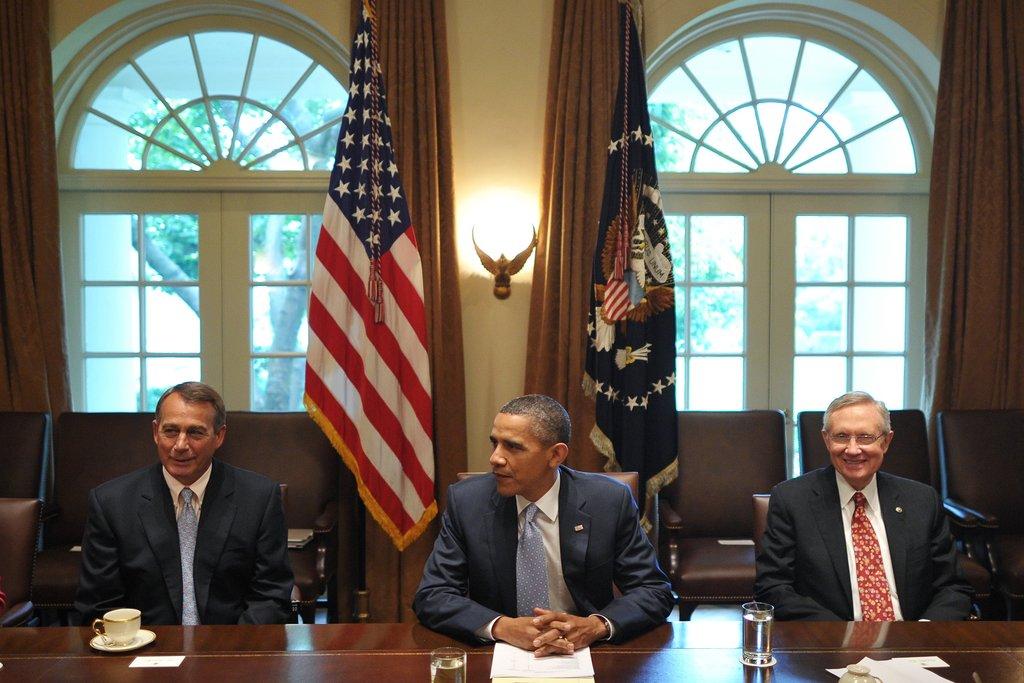Moody’s warning spotlights risk of US default
President Obama, House Speaker Boeher (left), and Senate Majority Leader Harry Reid at a debt meeting with congressional leaders in the Cabinet Room at the White House on July 13, 2011.
Ratings agency Moody's warned Wednesday the United States was in danger of losing its triple-A debt rating due to the risk of short-term default, heaping pressure on US lawmakers to clinch a deal on the deficit.
Amid growing concern that Washington will miss an August 2 deadline to raise the federal debt ceiling, Moody's Investors Service said it "considers the probability of a default on interest payments to be low but no longer to be de minimis."
(GlobalPost in Washington, D.C.: The United States: Too big to fail?)
Moody's move to put the United State's sterling AAA rating on review for a possible downgrade came as President Barack Obama sat down for what aids said was a stormy session of deficit talks with Republican lawmakers.
In four days of meetings this week the president and lawmakers have tried but failed to end a bitter ideological stalemate over how to reduce the country's long-term deficit.
Republicans are demanding a solution through deep spending cuts in return for backing what is normally a fairly routine matter or increasing the government's $14.3 trillion borrowing limit to avoid national default.
Obama wants a deal that would include tax increases, something Republicans have refused to countenance so far, in what some analysts now say amounts to a high-stakes game of chicken with the world's biggest economy.
The Financial Times reported:
The Moody’s action was expected, but by spelling out how even a brief default could lead to a lasting downgrade in the US credit rating, it heightens the pressure on Republicans and Democrats to reach a deal.
The Moody’s warning came as Ben Bernanke, the US Federal Reserve chairman, gave his most explicit warning yet on what would happen if the debt ceiling is not raised. In testimony before the House financial services committee, he said a recession on the scale of 2008 would be "certainly conceivable" and that it would have "a very adverse effect very quickly on the recovery."
Failure to increase the debt ceiling by August 2 would force the government to slash spending on programs like Medicare health insurance for the elderly and disabled, Social Security payments and even military salaries, all at a time when unemployment stands at 9.2 percent.
Bernanke warned that any default on the country's huge interest repayments on its debt could "throw the financial system into enormous disarray and have major impacts on the global economy."
Standard & Poor's Ratings Services cut its outlook on U.S. government debt to negative from stable in April, the first time it has ever done so.
The dollar weakened against most of its major counterparts in Asian trade Thursday morning, but Wall Street closed higher due to comments Bernanke made about the possibility of further stimulus spending.
"People may think that the U.S. dollar’s reserve status is diminishing, so that hurts the dollar," Imre Speizer, a strategist at Westpac Banking Corp, Australia’s second-largest lender, told Bloomberg.
The story you just read is accessible and free to all because thousands of listeners and readers contribute to our nonprofit newsroom. We go deep to bring you the human-centered international reporting that you know you can trust. To do this work and to do it well, we rely on the support of our listeners. If you appreciated our coverage this year, if there was a story that made you pause or a song that moved you, would you consider making a gift to sustain our work through 2024 and beyond?
